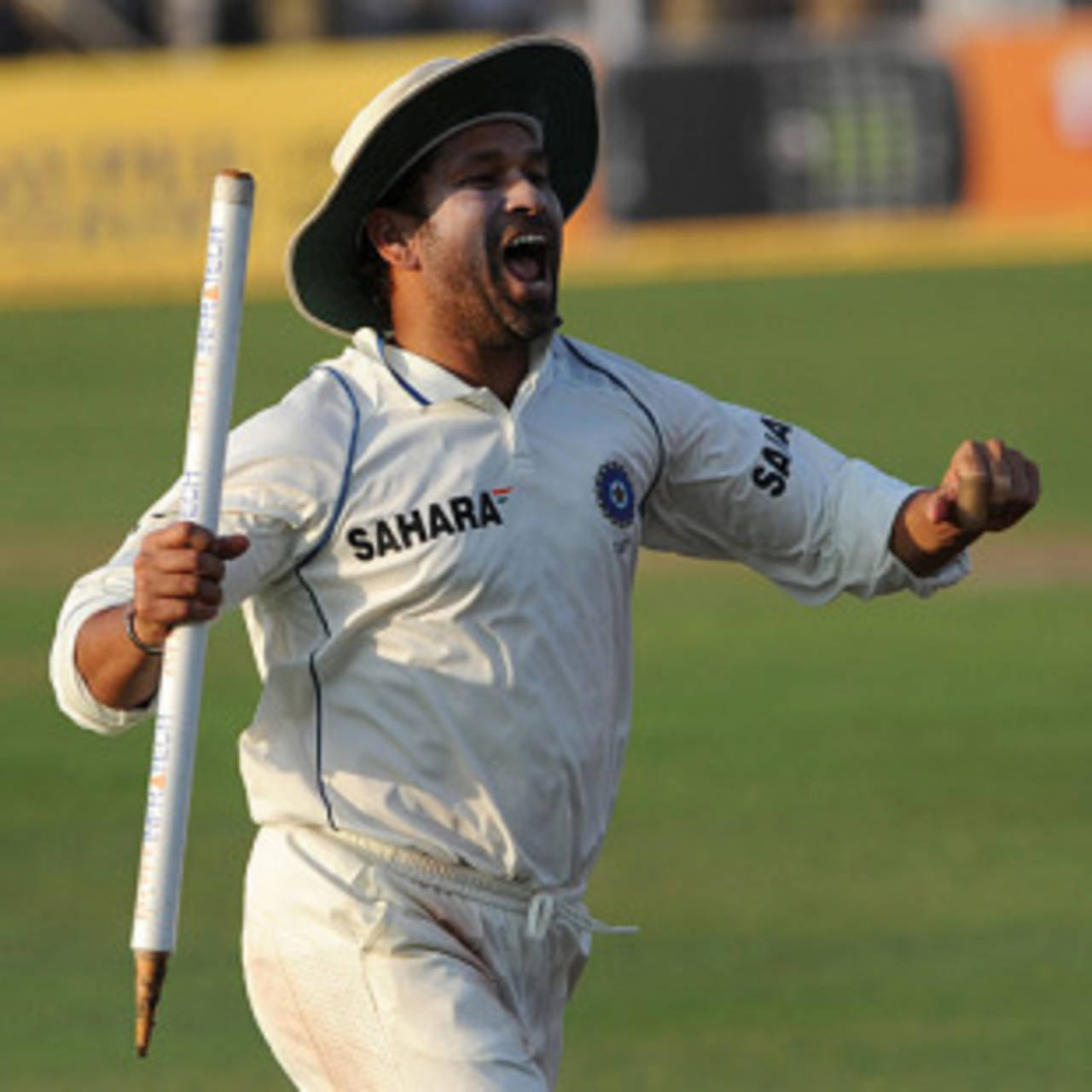Winning everywhere, and double-bouncers
Bradman's three-over century, Tendulkar's one miss, most runs conceded without a wicket, the devil's score, and more

Tendulkar has home and away wins against every team except Bangladesh • AFP
Sachin Tendulkar is missing this particular full set, as India have still not played a home Test against Bangladesh yet. He has won against everyone else both home and away, so has 17 of the possible 18 boxes ticked. Rahul Dravid is in the same boat. Ricky Ponting also has won in 17 places, but never in Pakistan, which he is unlikely to do now (he did, however, beat Pakistan in away Tests played on neutral ground, in Sri Lanka and Sharjah); the only men to have the full set of 18 are the South Africans Mark Boucher and Jacques Kallis. The others with 17 are Inzamam-ul-Haq, who never beat South Africa at home, Justin Langer (who never won in Bangladesh), and Makhaya Ntini (missing an away win in Sri Lanka).
The only one I know for sure is South Africa's AB de Villiers, who was caught and bowled by Mohammad Ashraful of Bangladesh in Mirpur in 2007-08. The ball bounced twice, and de Villiers had a swipe at it, thinking it would be called no-ball - but Law 24 says it is illegal if the ball bounces more than twice, so this one was all right. There may well have been other instances - this sort of thing is not necessarily noted in scorecards. Recently in an IPL match Iqbal Abdulla of the Kolkata Knight Riders bowled two deliveries that bounced twice against Chennai - he didn't take a wicket though. I'm not sure whether it was deliberate.
Actually I have answered this one before - but it turns out to have been so long ago (1999, actually) that it probably bears repeating. Don Bradman did indeed once score 100 in three overs - in 22 balls, to be precise. They were eight-ball overs, but it's still an unbelievable feat. It wasn't in a Test, or even a first-class match, but in an exhibition game in Blackheath - in the Blue Mountains near Sydney, rather than in Kent - on November 3, 1931. It wasn't a case of 0 to 100 in three overs, but rather a spell in the middle of an onslaught that brought him 256 runs, with 14 sixes and 29 fours, for a Blue Mountains XI against Lithgow Pottery. When someone called Bill Black came on, Bradman asked the wicketkeeper what was in store. He was told that Black was an offspinner - and had been boasting ever since dismissing The Don in a similar game two months previously. Bad move. Black's first over cost 33 (66424461), then an over from the innocent Horrie Baker cost 40 (64466464). Black's second over leaked 29 runs (16611446 - two of the singles came from Bradman's batting partner Wendell Bill). The chastened Black asked to be removed from the attack, nursing figures of 2-0-62-0 - and The Don had added 100 (out of 102) to his score in three overs. More details can be found in Irving Rosenwater's excellent and exhaustive biography of Bradman.
The holder of this unwanted record in Tests is the Bangladesh fast bowler Anwar Hossain Monir, who played three matches between 2003 and 2005, but conceded 307 runs without managing to take a wicket. In second place is a more occasional bowler, George Headley of West Indies, who took 0 for 230 in various spells during his 22 Tests between 1930 and 1954. Headley did, though, have a batting average of 60.83 to console him. In one-day internationals the unfortunate leader is Sri Lanka's Athula Samarasekera, who took 0 for 291 in 39 matches between 1983 and 1994. In second place here is the Dutch slow left-armer Jacob-Jan Esmeijer, who took 0 for 206 in six matches in 2002-03.
My first thought was that hits over the boundary counted as five runs then, and you had to hit the ball out of the ground for six - but actually that was the general rule in Australia at that time (1899), not in England, where hits over the boundary for what we now call sixes were still worth only four runs. It stayed that way until 1910. So I think Abel's fives must have involved overthrows - or they may well have been all-run, given the large size of the outfield at The Oval.
No side has made 666 in a Test - the nearest approaches are 668 by Australia (against West Indies in Bridgetown in 1954-55) and 664 by India (against England at The Oval in 2007) - and until recently there were no instances in first-class cricket, either. But then, in a Quaid-e-Azam Trophy match in Sialkot in November 2007, Sialkot had reached 666 for 7 in reply to Hyderabad's 415 when the match ended as a draw.
Cricinfo's database king Travis Basevi (the man who built Statsguru) has come up with three further instances in Tests of one batsman having made his debut before his batting partner was even born. In addition to the occasion involving Wilfred Rhodes mentioned last time, Rhodes (Test debut 1899) also batted with Harold Larwood (born 1904) against Australia at The Oval in 1926. Then, against Sri Lanka in Faisalabad in 1991-92, Pakistan's captain Imran Khan (debut 1971) batted with both Zahid Fazal (born 1973) and Moin Khan (born September 1971). The only instances we can find in one-day internationals involve Saleem Malik (ODI debut January 1982) and Hasan Raza (born March 1982), who batted together for Pakistan against Zimbabwe in Quetta in 1996-97, and on two or three subsequent occasions.
Steven Lynch is the editor of the Cricinfo Guide to International Cricket. If you want to ask Steven a question, use our feedback form. The most interesting questions will be answered here each week. Ask Steven is now on Facebook